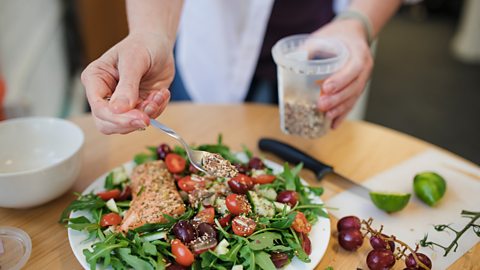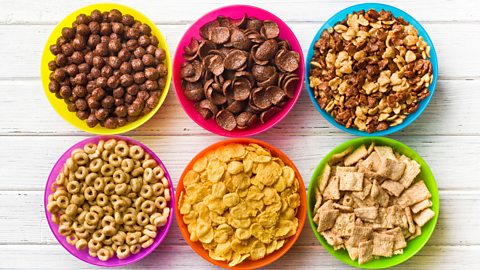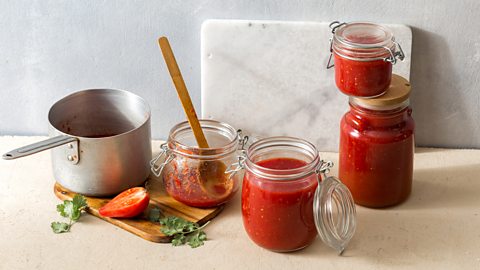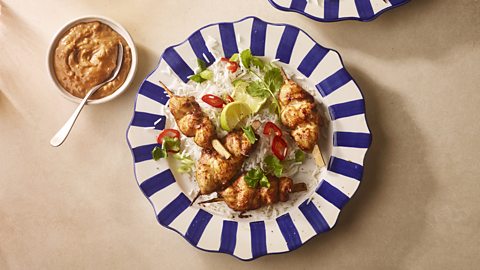What uni years taught me about diet and mental wellbeing

by Lottie Savage
Excitement and enjoyment, quickly followed by anxiety and stress – uni can bring fluctuating emotions that change day by day, or even hour by hour. A bad mood can arrive with no explanation, while social pressures, a large workload, or lack of sleep may lead to low feelings.
Throw in coronavirus restrictions, and days can blur into one, especially if you’re still studying from home. It becomes harder to conjure up motivation. Completing my final year of a nutrition degree in lockdown, I struggled to concentrate on online lectures. And nothing about my student house bedroom made for a focused working environment.
It’s tempting to turn to food and drink to get you through low moods and tiredness. But some foods work better than others. Here are a few tips.
Eat plants not junk food
Student accommodation is scattered with the remnants of junk food – delivery boxes tossed into the recycling, an empty noodle cup abandoned by the kettle, or fizzy drink bottles rolling around under the sofa. But despite their colourful packaging, these foods are unlikely to brighten your mood in the long term.
Junk food refers to pre-packaged foods high in saturated fats, refined carbohydrates, salt and/or sugar, with a low nutritional value. A diet high in junk food and fast food has been linked to inflammation, where the immune system is over stimulated. In turn, scientists have linked high levels of inflammation to mood disorders. Avoiding a pro-inflammatory diet, for example by eating a Mediterranean diet rich in vegetables, legumes and unsaturated fats, is associated with better mental health and some protection from depression.
There’s also evidence diet impacts mood through your gut microbiome. The gut and brain communicate with each other via the gut-brain axis, and disruption to the gut microbiome has been shown to impact mental health. This disruption can be caused by a diet high in saturated fats, sugar and/or ultra-processed foods.
So how do you maintain a healthy gut microbiome? Think of your gut as a garden – a diverse range of flourishing species will invoke happier feelings than dried up grass. But instead of plants, your gut contains bacteria. To achieve this rich microbial ‘garden’, you need to feed your gut bacteria a variety of plants, such as wholegrains, legumes and vegetables, providing rich sources of fibre and other nutrients to help good bacteria thrive.
Sugary foods won’t cheer you up
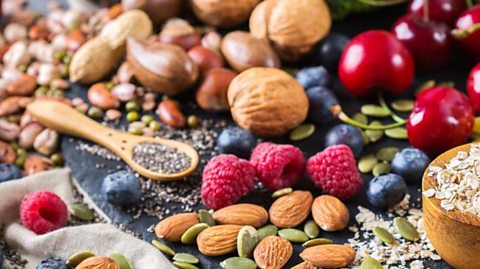
Low feelings can leave you searching for a quick fix, often through high-sugar foods. When an unproductive day leads to frustration, what could be more tempting than a chocolate bar placed at eye-level at the supermarket checkout? The floodgates are open once you break off that first piece, and before long the chocolate is gone.
Eating and drinking refined carbohydrates, such as cakes, biscuits, white bread, milk chocolate and sugary drinks, makes your blood-sugar levels rocket and then plummet. This can lead to anxiety and irritability.
Snacking can feel like a good distraction from uni work – especially after a big food shop, when sugary treats are just a room away. When you start feeling peckish, try eating foods that release sugar more slowly, such as nuts and fruit. The more fibre in a food, the more gradual the release of sugar, helping to maintain steadier blood-sugar levels.
Cooking can be relaxing
Cooking can seem like a burden. Life on a student budget probably means opening the fridge doesn’t hit you with inspiration, and many students will recognise that slightly off-smell of a fridge that should have been cleared out ages ago.
Students often settle for a lot of meal repetition. I had a friend who rarely ventured further than a jacket potato with tuna. But this doesn’t have to be the case – ask your flatmates for ideas and scroll through recipes online. Once you’ve got your recipe, it’s time to relax.
I find following a recipe calming. Focusing on completing one step at a time is a good distraction from the day’s worries. It’s not just the sense of achievement that comes with making a delicious meal that can boost your mood, but all the little motions along the way. The satisfaction of a sharp knife gliding through vegetables, the noise of boiling water, the meditative motion of stirring a bubbling pan as the aroma fills the kitchen. I guess the only downside is there will always be washing up, but maybe that can be relaxing too?
High-caffeine drinks come with consequences

Caffeine is a student go-to. Whether you’ve had too little sleep or have a rapidly approaching deadline, it’s the obvious answer – and no wonder when it can help maintain attention. I hate to think how much money trickled from my account to keep up my coffee habit whilst studying. But others took caffeine consumption to the next level, and could sometimes be found sleeping among a sea of empty energy drinks after an all-night studying stint – you hoped they made that deadline!
Not only are high-caffeine drinks usually filled with sugar, leading to a blood-sugar spike followed by a crash, but also the caffeine can disrupt sleep, causing fatigue and a lowered mood the next day. A high-caffeine intake can also cause irritability and anxiety, and people with underlying mental health conditions such as a panic disorder can be more susceptible. It may feel like a good idea to stockpile caffeinated drinks to boost your work level, but it’s important to consider the effects they may have on your mood. Maybe all you need is a nap!
Alcohol can’t make you happy
For a lot of students, drinking takes centre stage when socialising, ranging from a beer in the garden as the sun sets to a night filled with alcohol mixing, only 12 hours later leading to the declaration “I’m never drinking again”. University can be tough on your mental wellbeing, and with excessive drinking normalised it’s easy to use it as a coping mechanism to avoid facing challenges.
A few drinks can make you feel great at the time, due to your body reacting to the alcohol by releasing ‘happy hormones’ such as dopamine and serotonin. However, the more (and the more frequently) you drink, the more your body starts to rely on alcohol for these happy hormones, and so decreases its own production. Mix this with the low blood-sugar levels and dehydration left by alcohol, and it can lead to worsened anxiety, lower energy levels due to the disruption alcohol has on sleep, and negative consequences for your mood.
A Sunday morning dedicated to being hungover can leave you with anxious and slightly hollow feelings, resulting in a day sprawled on the sofa eating junk food. If you are hungover, it’s worth trying a change of scene to lift your spirits instead, such as a long walk in the fresh air. It took lockdown to finally get me exploring all the scenic nature spots nearby, giving me a whole new appreciation of my university city.
What next?
It’s important not to demonise foods – sometimes that treat is exactly what you need. But it’s a good idea to understand how foods interact with your body and mental wellbeing so you can consider this when making choices. Simply eating regular, nutritious, meals, will help keep your sugar levels and mood more consistent.
Lottie Savage graduated with a BSc in Nutrition from the University of Leeds in 2020.
